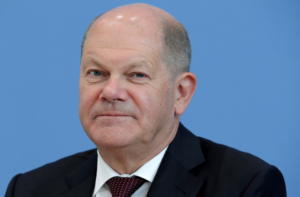The Winds of Political Change: A Closer Look at Germany’s Upcoming Election
As we approach February 23, 2024, the atmosphere in Germany is thick with tension, anticipation, and potential upheaval. Chancellor Olaf Scholz faces the possibility of political extinction as recent polling suggests a significant shift in voter sentiment. At Extreme Investor Network, we understand that these trends are not isolated but rather part of a broader global narrative experiencing a rightward push against the backdrop of progressive policies that many believe have failed.
Polling Insights: A Shift to the Right
The latest data indicates that the Social Democratic Party (SPD), under Scholz’s leadership, has seen its favorability decline to 15.5%—down from the previous month, according to Bild newspaper. This decline signals a troubling trend for the SPD, as the conservative Christian Democratic Union (CDU) and its sister party, the Christian Social Union (CSU), lead the pack with 31% support. The rise of the Alternative for Germany (AfD) Party to 21.5% captures the essence of a populace dissatisfied with the status quo.
The Landscape of German Politics
While the Greens have managed a small uptick in favorability to 13.5%, this level of support pales compared to the leading parties. It’s worth noting that every other political faction is below the 5% threshold, highlighting a significant voter backlash against the left-leaning political agenda that has dominated German politics in recent years.
This sentiment echoes a broader European trend where nations are experiencing a collective pushback against progressive ideology. Countries like Italy, France, and the Netherlands have seen right-leaning parties gain substantial ground, reflecting a populous weary of open borders, climate change initiatives, and social policies perceived to align more with a “woke” agenda than the everyday concerns of citizens.
The Aftermath of Scholz’s Leadership
Scholz’s tenure has not been without its controversies. His government, criticized for leaving a massive gap in the budget and compromising Germany’s economic sovereignty at the altar of EU ambitions, has led many to question his leadership. Moreover, the geopolitical landscape has shifted dramatically; Germany’s reliance on American protection under the Biden administration appears to be waning, leaving the left vulnerable on multiple fronts.
The events unfolding in Germany are not simply political but deeply economic as we brace for a potential recession that could last from 2024 well into 2028. At Extreme Investor Network, we believe that incoming governments will face the formidable challenge of reversing course amidst a backdrop of economic turbulence and pressing social issues.
The Path Forward: A Long Road to Recovery
Looking ahead, the political landscape in Europe seems poised for a turbulent transformation. Many analysts predict that Marxist ideologies may face severe backlash, potentially reaching its conclusion by 2037. However, this transition will undoubtedly come with significant pains, as governments grapple with the consequences of prior administrations’ policies.
As we monitor the developments leading to the February 2024 election, we encourage our readers to stay informed. The implications of this election extend beyond Germany, shaping the future of Europe’s political climate.
At Extreme Investor Network, we are dedicated to providing insights and analytics to help you navigate through these changes, understanding both the risks and opportunities that lie ahead. Prepare yourself for a rapidly changing landscape, and don’t miss out on our expert commentary and forward-thinking strategies. Together, let’s understand the future of investment in an ever-evolving world.

